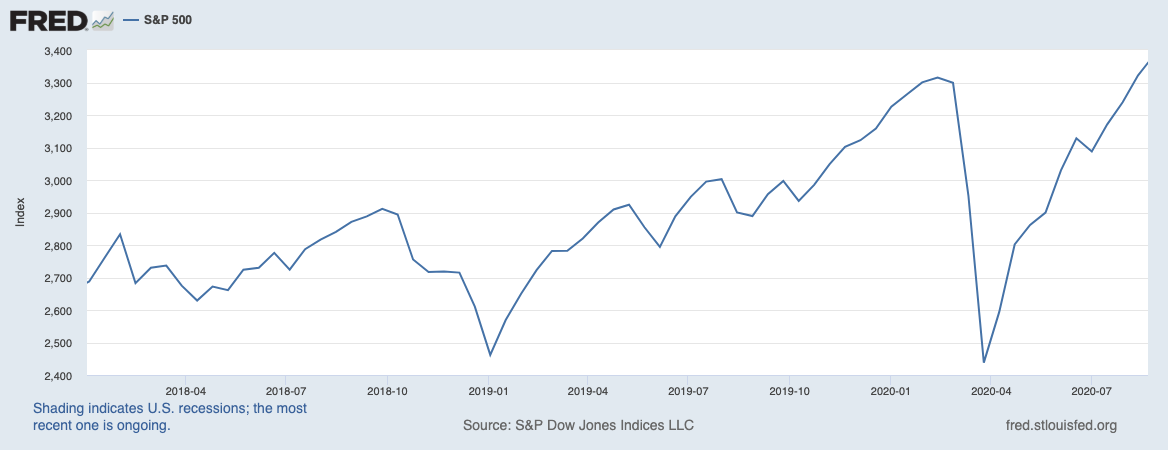In the second quarter, S&P 500 corporate earnings were down over -30% on approximately -10% lower revenues.1 Daily confirmed cases of Covid-19 in the United States continue at a pace in-line with early days of the outbreak, and the Bureau of Labor Statistics’ July unemployment report showed 16+ million unemployed Americans with an unemployment rate of 10.2%.2
Meanwhile, the S&P Index is trading at all-time highs.
S&P 500 Since 2018: Volatile, But Still at All-Time Highs

Source: Federal Reserve Bank of St. Louis3
I have written before about this seeming disconnect between what the stock market is doing and what we’re seeing in the U.S. economy and in the news. In my view, the stock market is arguably pricing-in what the economy will look like a year from now, and what the market sees is significant pent-up demand, a fading pandemic-induced economic impact, and a wall of liquidity coursing its way through capital markets.
The question I want to address is this column, however, is whether investors should be concerned about the U.S. stock market hitting all-time highs with the economy still bruised and slowly recovering. Does the market reaching all-time highs mean a crash or major correction is coming?
No one truly knows the answer to that question. We know that market corrections and bear markets are normal and common, but we do not know when they will arrive or how long they will last. If anyone tells you ‘with certainty’ when market downside is coming and how long it will last, my advice is to run the other way.
In thinking about where the markets and economy could go in the next year and beyond, I find it useful to break it down by key category:
- Economics – The pandemic-induced recession was steep and ugly. But I think there is a good argument that the worst of the crisis is now behind us. Manufacturing and services activity have rebounded firmly off lows, the housing market has seen very solid activity, and spending has outpaced expectations. In other words, with the second quarter as a starting point, I expect the economy to grow and for the employment situation to gradually improve.
- Earnings – Second quarter earnings were bad, plain and simple. But at the same time, I would argue that earnings were not as bad as expected, and stocks love positive surprises. Indeed, 80.0% of S&P 500 companies beat earnings-per-share estimates and 62.9% beat revenue estimates in Q2, both firmly above historical averages for beat percentages.4 Will earnings continue to improve going forward? I think so.
- Interest Rates – Overnight rates in most developed countries are near historic lows, meaning that borrowing costs and financing costs are highly attractive for businesses and individuals that can obtain loans. Central banks around the world also appear poised to keep interest rates low for years to come, which makes equities attractive by comparison, in my view.
- Inflation – The amount of global stimulus is absolutely massive, and by comparison, it is many times bigger than the stimulus deployed in the late stages of the 2008 Financial Crisis in 2008-09. It is a bit crazy to fathom, but the total global fiscal and monetary stimulus being deployed amounts to approximately 28% of world GDP.5 This ‘wall of liquidity’ makes inflation seem more likely in the coming years, and will be a factor to watch.
- Sentiment – I think consumer and investor sentiment is improving in the wake of the pandemic but may sour as the election nears. The mixed bag on sentiment may be ok for stocks, ultimately – not too hot, not too cold.
Bottom Line for Investors
The nature of bull markets is that we can expect the stock market to reach new highs over time. It is what history tells us to expect every time.
As such, I would caution against seeing an all-time high as a reason to go defensive or to take profits off the table. For one, selling into the market’s strength is a form of market timing, which I do not advocate. But more importantly, when setting a long-term investment strategy, it is important to consider how the economy may grow or contract in the next six, twelve, even 18 months. In my view, the economy one year from now will be in better shape than it is today, and owning stocks means participating in the growth that happens between now and then.
Disclosure
Zacks Investment Management, Inc. is a wholly-owned subsidiary of Zacks Investment Research. Zacks Investment Management is an independent Registered Investment Advisory firm and acts an investment manager for individuals and institutions. Zacks Investment Research is a provider of earnings data and other financial data to institutions and to individuals.
This material is being provided for informational purposes only and nothing herein constitutes investment, legal, accounting or tax advice, or a recommendation to buy, sell or hold a security. Do not act or rely upon the information and advice given in this publication without seeking the services of competent and professional legal, tax, or accounting counsel. The information contained herein has been obtained from sources believed to be reliable but we do not guarantee accuracy or completeness. Publication and distribution of this article is not intended to create, and the information contained herein does not constitute, an attorney-client relationship. No recommendation or advice is being given as to whether any investment or strategy is suitable for a particular investor. It should not be assumed that any investments in securities, companies, sectors or markets identified and described were or will be profitable. All information is current as of the date of herein and is subject to change without notice. Any views or opinions expressed may not reflect those of the firm as a whole.